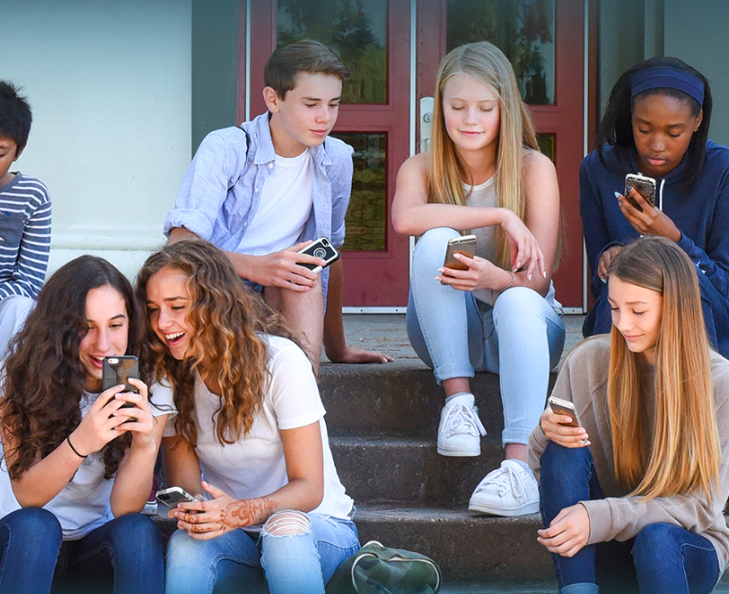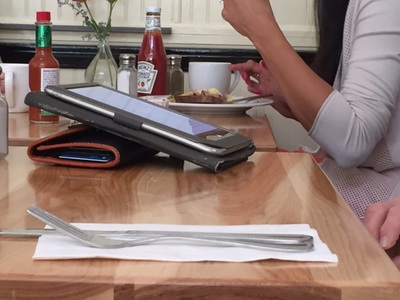|
Tricky, tricky, tricky. Life keeps doing its thing, keeping us on our toes. Twenty-three years ago I stopped watching TV. For me, life outside the screen is just more interesting. I don’t experience FOMO (Fear Of Missing Out). I still stay tuned to enough news stories. I still live in the modern world, lacking nothing that TV offers. As a matter of fact, I have seen my quality of life largely enhanced by this choice. Yet clever ol’ life has outsmarted me once again, depositing the next big challenge right in the palm of my hand. A computer phone — commonly called a smartphone — and it’s packed with sweet social media temptation. Two decades after I’d stopped finding any allure behind the screen, now I can blast my love-note-rockets across the planet instantly, to family and friends 200 or even 5,328 miles away. What’s fabulous about that? My husband’s family lives in Sweden, and it is really nice to so easily share photos of our daughter with them. From not-even-a-little-bit-tempting, to suddenly delicious. Oh, boy. We’ve all got ways our life is made more meaningful and fun with social media. Entirely shutting ourselves out of the joys of modern technology is neither reasonable nor very productive. Years ago when I tried to go back to a call/text-only phone, it clogged my ability to do many things I enjoy. That wasn’t the answer for me. And it’s not the answer I seek for the problem we face as a society: a mass addiction that we rarely discuss and barely even see. Tricky, tricky, tricky. Not cut and dry. Not black and white. And not One Size Fits all. Enter, Screenagers the movie. Produced by a concerned mother who’s a Stanford trained MD, the movie explores screen life among teenagers, children and families. Impacts on the brain of adolescents, tendencies of boys to play violent video games while girls take selfies and aim to look “good,” the importance of role modeling by parents and how families can benefit from the use of structures like agreements around smartphone use. The film features Sherry Turkle, Director of the MIT Initiative on Technology and Self, who has rigorously researched and explored the use and impact of screens in our time. As I watched the film, it was like I’d walked thirsty for miles and finally reached water. Bothered for many years by our societal lack of mindfulness around screen time, I have initiated some conversation around it and taken my own strides toward a more conscientious relationship with the screen. When we’re bothered, we need to take personal responsibility first and foremost. If I’m picking up the phone-computer or laptop-computer every time I sit down to relax, what does that tell my daughter? Children mimic what we do, and I don’t want her to treat the computer like a best friend. Isn’t this what we do? As with a best friend or lover or newborn baby, we tend to our computer-phones with utmost devotion. Like keys, wallets and lip gloss, we know where our computer-phone is at all times. It buzzes or beeps and we tend to it within seconds. Hundreds of times a day, we interact with it. It sleeps next to us and sits on our dining table top like a precious jewel. Last week, as I sat at my favorite cafe planning my week, I noticed a screen at every table surrounding mine — and I took these photos. Surely they’re not unfamiliar to anyone reading this. Perspectives on screen use vary widely. With this issue as with life itself, we are best off when we discover and honor our own values, allow others to do the same, and don’t take it personally when people don’t feel the way we do. Some parents say computers are “the future” and want their kids using them as much as possible to keep up with technology. Some parents — consciously or unconsciously, the whole range exists — use computers as babysitters, either for an hour a day or even 6 hours a day. Some families don’t allow screen time at all in the household, because they feel the society will provide enough of that and they want to be sure their children are sufficiently exposed to things like outdoor play in nature, music and human interpersonal connection. As shown in the Screenagers film, some parents have established boundaries and practices like Tech Free Tuesdays where dinnertime is screen-free and conversation centers around sharing with each other about screen habits, what’s working and what’s not working, concerns and joys. That’s just a sampling of how screen-life looks in families. You might have a situation that’s totally different from any of these. What works for you? Have you found a healthy balance for your family or household, one that honors the desires and freedom associated with computer use and also has a solid tone of mindfulness around use, risks and benefits? Striking a balance around device-use requires self-awareness, mindfulness, and a desire to have your impact in the world be more intended, than unintended. This doesn't just happen. We have to step in and step up. Tricky. For our family, with two parents who have strong preferences in most areas of life and one three year old daughter, it’s absolutely a work in progress. Mama Bear Rio will now give myself permission to share passionately about my perspectives on the issue, for the sake of my own clarity and expression, and for any others who find it helpful as you consider yours. From my maternal instinct and personal sense of human responsibility, I approach screen-time with the eye of a skeptic. I smell with my primal mind the addictive nature of screen-time and I’m on to it; it will not have power over me. If I am going to depend on something so much, and let it be close to me so often, then I’ve got to have a really clean, beneficial relationship with this thing. We are, after all, engaged in an intimate relationship with our phones — are we not?Boundaries and agreements are an essential part of healthy intimacy. My phone doesn’t sleep next to me; it sleeps on the kitchen counter. I do not respond to texts or calls right away unless I want to in that moment. We do not bring our phones to the dining table; that’s a sacred place for gratitude and presence, above all things. Once the sun goes down, the screen stays off. I trust myself and my ‘inner meter’ of awareness, to tell me if any given day — or road trip, or week, or morning — has had too much screen time and not enough play, music, reading, eye contact... or just being. When I’m with my daughter, unless I’m engaged in something timely or on a roll with writing, or otherwise genuinely needing to tend to whatever I’m doing on the screen, she is the priority. When she needs something, the screen waits. There will be no hazing and dazing out in La La Screen Land when my greatest spiritual teacher is in my company. How does this work? I simply try to power-out my screen use when she’s not around, taking care of things in a more productive and condensed fashion. Her presence holds the bar high for me in this area, and I’m the last person who’ll deny her invitation to step up my game. Every few days she might glimpse something on my screen, like a Facebook photo or a music video, and that’s fine. For us this isn’t about extremism. It’s about finding a reasonable, authentic balance for our family. And these aren’t hard rules I am chained to. They are principles that guide what feels like a healthy relationship, between myself and the computer screen, for the sake of our family.  Pete Kirchmer Pete Kirchmer In his February 2015 post The Device Diet, Mindfulness Based Health Founder Pete Kirchmer writes, “Five years ago I’d never had a client request coaching around social media compulsion and device addiction. This is a phenomenon that has been around for awhile but is more recently emerging as a relevant topic for all of my clients, despite demographic or the primary coaching goal they came with. It seems we are all united by this common distraction and our desire to gain control over it.” Anytime I contemplate the relationship we have with our screens, our devices, at first it all seems a bit daunting. Then I remember how useful it is for us humans to face challenges — spiritual, physical, emotional, mental — so that we can practice all the great things worth practicing.
Presence is one of these great things. Mindfulness has become a very popular subject in recent years and I can’t think of a better challenge to set the bar high, than the allure of these handy little pocket-computers, with all their little charming emoticons and customizable alert sounds, the ability to take and share photos and videos in a split second… It’s all pretty snazzy. Yet we’re made for these times. The huge success of the movie Screenagers gives me hope that we may be facing quite a jewel of a challenge, in actuality — one that’ll “call out” humanity in a compelling enough way to bring us far-more-fully into the present moment. The "precious present," as it has been called. The place where mindfulness leads. For now, it’s dark outside and I need to shut down this screen.
0 Comments
|
AuthorJessica Rios, Founder of Leaning into Light, was born with a divine pen in her pelvis. Her heart writes for her; Love is her 'religion'. A lifelong letter writer and a thought leader in Love, her blog is devoted to her greatest passion: illuminating the beauty of the human spirit so we all move closer to remembering that Love is Who We Are. Categories
All
Archives
April 2024
|







 RSS Feed
RSS Feed